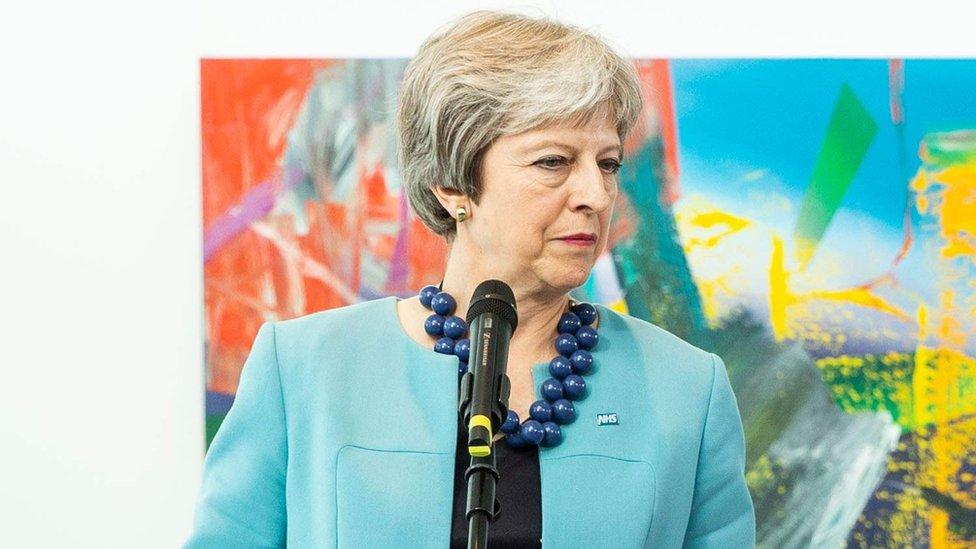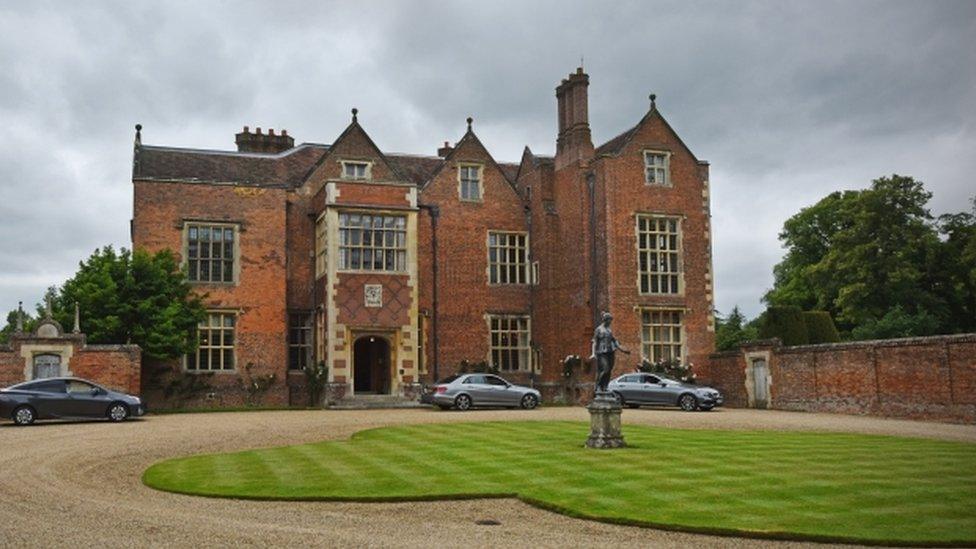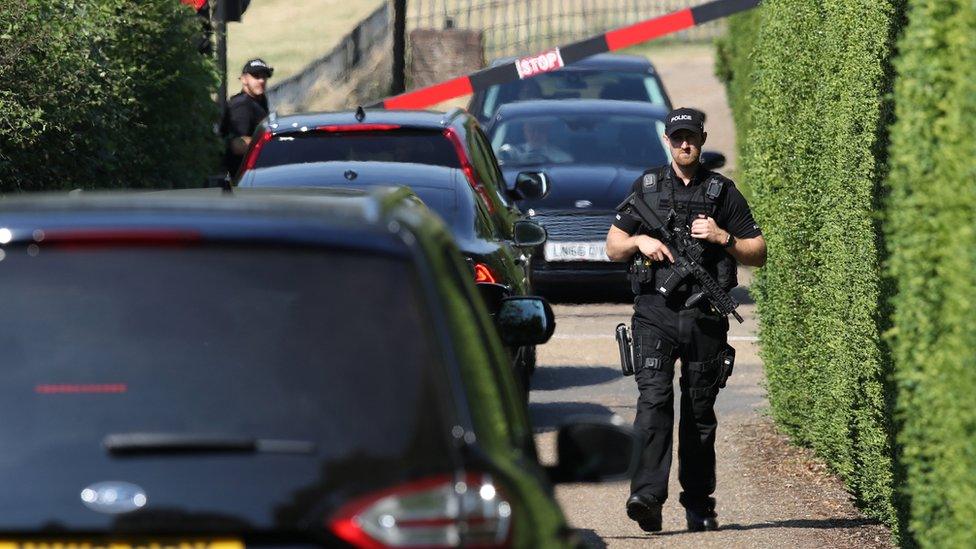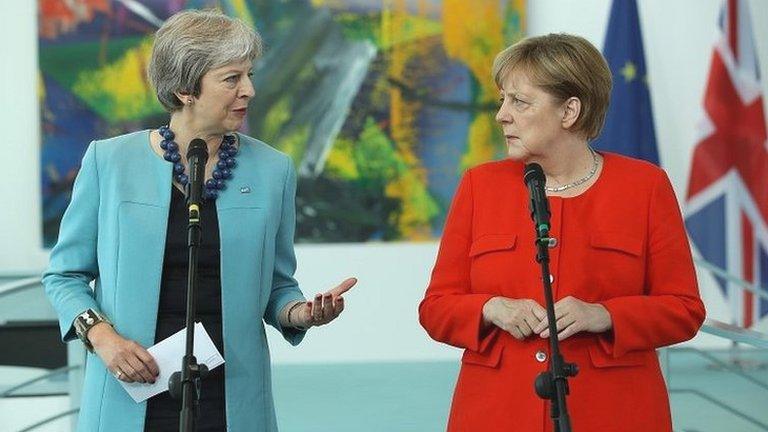A dramatic day in store at Chequers
- Published

Often the hype about a political event is in inverse proportion to the drama of what actually comes to pass. Maybe not this time.
Cabinet ministers will today meet at Chequers with the aim of approving the prime minister's blueprint for the UK's future relationship with the EU after Brexit.
But Brexiteer ministers have warned that the 120-page plan as written is flawed. They were discussing late on Thursday how to respond during the cabinet meeting.
And to say that they are a bit miffed with the plan, which they only received in its entirety on Thursday afternoon, is an understatement. There is plenty in there that they don't like, and it's easy to see why.
The BBC understands that the plan includes:
A commitment for a legally binding agreement to follow EU rules on goods, so that they can be traded freely under a "common rule book"
A commitment to end free movement that could mean there would be no deal on services, which makes up the majority share of the economy
The UK would have to continue to accept the remit of the European Court of Justice in some areas
The paper also suggests that, while trade deals with other countries like the US would be possible, they might be harder to do because under rules agreed with the EU, it would be harder to meet other countries' "asks".
One cabinet minister also expressed unhappiness with the proposed customs model - the facilitated customs arrangement - saying that it was like "customs partnership minus" - simply a revision of the customs partnership model that was rejected by the inner Brexit cabinet committee weeks ago.
One senior Tory suggested that "the party wouldn't wear it". A senior Brexiteer minister said that a lot of the document was "problematic", and that there was a "lot of scope for argument".
Essentially, for those who want a dramatic break with the EU, it falls far short, even though Number 10 insists it is merely an evolution of what the prime minister has already promised.
Frankly, from what we have heard, language is doing a lot of the heavy lifting, with much of it "opaque".
It does sketch out a relationship with the EU that is much tighter than Brexiteers had argued for. Would it really be Brexit? Number 10 would say yes, Jacob Rees Mogg would say no.
For the rest of us? That depends what you think the country voted for.

The cabinet Brexit meeting will take place at the prime minister's country estate Chequers
Tension around the meeting is high, with ministers being instructed in an email that they will have to hand in their phones and Apple watches on arrival at Chequers.
Brexiteer ministers shared concerns at a meeting in the foreign secretary's office on Thursday night over the plan, with a source saying "it's not going to fly".
They said that they will "simply reject it if she tries formally to impose it". But another Brexiteer source said they would have to "talk it out" before coming to any conclusions about the plan.
But a cabinet minister who has been pushing for a tight relationship with the EU told the BBC that while the plan was "fiendishly complicated... no one had a better idea".
A former cabinet minister who advocates closer ties to the EU told the BBC that they had urged the prime minister to consider sacking Brexiteers who refuse to sign up.
They suggested that "blood on the carpet" might not be a bad thing. They said they believed the prime minister "has had enough steel put in her spine" to be able to command ministers to back her plan or carry out a reshuffle.
There is however concern in the City, too, over the suggestion of giving up the prospect of a close deal on services to guarantee an end to free movement. One insider suggested that Chancellor Philip Hammond may try to "wedge" services back into the draft agreement on Friday.
Sources on all sides of the argument suggest that it is too early to tell how the talks tomorrow will end. There are demands for "significant redrafting". The discussions start at around 10:00 BST and are expected to wrap up at about 22:00 BST.
Insiders also suggest that with the EU likely to reject much of the plan, the real debate will focus on what to do if and when Brussels says no, with Brexiteers pushing a "Canada plus" model.
Another cabinet minister told the BBC that even though the EU was unlikely to accept it straight off, the point of this week's talks was not to find a final agreement, but simply to "start a conversation" with Brussels so that vital talks on the future relationship can get going.
Until now, the negotiations have focused on the withdrawal agreement - the divorce deal - with no formal engagements over the long-term arrangements. An outline of the political agreement on that deal is supposed to be in place by October.
To have any hope of a genuine and substantial deal by the autumn, the prime minister needs Brussels to take her, and her approach, seriously. If she fails to get agreement, her ability to project the authority that's needed for that to happen will be seriously put into question.
But if she pushes ahead with the plan she will have to face down a powerful and vocal wing in her party.
Some of her colleagues might heave a huge sigh of relief, and think, "about time too". But her party, and the rest of us, have no way of knowing tonight if that decision - which would risk her leadership - is one she is really willing to take.
- Published6 July 2018

- Published5 July 2018

- Published5 July 2018

